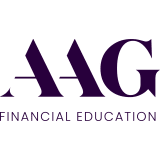This informal CPD article, ‘The Importance of Financial Education in the Workplace’, was provided by AAG Financial Education (AAG). Founded in 1995, they provide long-term, comprehensive, and bespoke financial education to their clients.
In today's dynamic business environment, financial education has become increasingly vital in the workplace. Providing employees with the knowledge and tools to manage their finances not only enhances their personal well-being but also contributes to a healthier, more productive workforce. Here’s why financial education in the workplace should be a priority for employers.
Empowering Employees
Financial education empowers employees to take control of their financial futures. Many workers face significant stress related to money management, including debt, savings, and retirement planning. By offering financial education programs, employers can equip their employees with the knowledge needed to make informed financial decisions. This empowerment can lead to improved financial health, which, in turn, can positively impact overall job satisfaction and morale.
Enhancing Productivity
Financial stress can be a significant distraction for employees. Individuals dealing with financial anxiety can sometimes be less productive, more likely to miss work, and less engaged in their roles. By providing financial education, employers can help alleviate this stress, allowing employees to focus more on their tasks and responsibilities. An informed workforce is likely to be more productive, resulting in improved outcomes for the organisation as a whole.
Fostering Employee Loyalty and Retention
Investing in employees’ financial education demonstrates that an employer values their well-being. This investment can foster a sense of loyalty and commitment among employees. When workers feel supported in their financial journey, they are more likely to stay with the company, reducing turnover rates and the associated costs of recruiting and training new staff. A strong focus on financial education can contribute to a positive workplace culture, making it an attractive environment for existing and prospective employees.
Promoting Retirement Preparedness
One of the most significant financial concerns for employees is retirement planning. Many individuals lack a clear understanding of how to save effectively for retirement or the importance of starting early. By offering financial education programs focused on retirement planning, employers can help employees make informed decisions about their retirement savings options, such as employer-sponsored plans and individual retirement accounts. This guidance not only benefits the employees but also reduces the potential financial strain on employers who may be responsible for retirees' benefits.
Supporting Diverse Needs
Workforces today are increasingly diverse, with employees from various backgrounds, cultures, and financial situations. Financial education programs can be tailored to address the unique needs of different employee groups, ensuring that all workers receive the information and resources that are most relevant to their circumstances. By providing inclusive financial education, employers can help bridge the knowledge gap and promote financial literacy across the entire organisation.
Strengthening Financial Resilience
Financial education equips employees with the skills needed to manage unexpected financial challenges. By learning about budgeting, saving, and investing, employees can build resilience against economic downturns, personal financial crises, or unexpected expenses. This resilience not only benefits employees on a personal level but also contributes to a more stable and secure workforce, ultimately benefiting the organisation as a whole.
Conclusion
In conclusion, financial education in the workplace is essential for empowering employees, enhancing productivity, and promoting overall well-being. By investing in financial education programs, employers can create a more engaged, loyal, and financially secure workforce. As financial literacy becomes increasingly important in today's complex financial landscape, prioritising workplace financial education is not just a benefit—it's a necessity for fostering a thriving organisational culture and ensuring long-term success.
We hope this article was helpful. For more information from AAG Financial Education (AAG), please visit their CPD Member Directory page. Alternatively, you can go to the CPD Industry Hubs for more articles, courses and events relevant to your Continuing Professional Development requirements.













